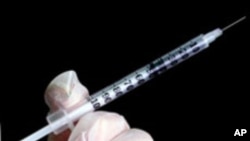US researchers are calling it a "Big Deal." Next year, human clinical trials could begin on a novel AIDS treatment that alters DNA, turning cells into HIV fighters. The treatment has completely protected monkeys from a primate version of the immune disorder.
Researchers are engineering healthy muscle cells to induce them to crank out genetic instructions that could potentially neutralize HIV, the virus that causes AIDS in humans.
Scientists at Scripps Research Institute used the technique to completely protect rhesus macaque monkeys whose immune systems were repeatedly exposed to simian immunodeficiency virus, or SIV, a primate version of HIV.
After treatment, Scripps researcher Michael Farzan says the macaques never became infected despite the challenge.
“We continued to administer the virus, doubling the dose each time. We’ve now gone with ..six doses that were capable of infecting control [untreated] animals. We’ve gone to 16 times that," said Farzan.
The findings were reported in the journal Nature.
Traditional vaccines train the immune system to recognize and destroy microbial invaders. But experimental AIDS vaccines fail because the virus is continually changing its appearance to evade destruction.
Farzan, the study’s lead investigator, says the new approach tricks HIV into revealing a key viral surface protein. The compound targets the portion of the virus that is always mutating to avoid the immune system.
Once bound, a second protein makes the virus self-destruct so it never has a chance to infect cells.
“Because HIV is fooled into thinking it’s binding the cell, it undergoes the changes that it would normally do when it’s ready to enter a cell. And those changes, if it’s not near a cell, inactivate the virus," said Farzan.
The muscle cells continually pump out decoys that fool the virus into destruction.
Farzan says the compound has the potential both to protect against infection with HIV and to fight the virus in infected people.
The team wants to begin clinical trials in patients who cannot tolerate antiretroviral drugs.




